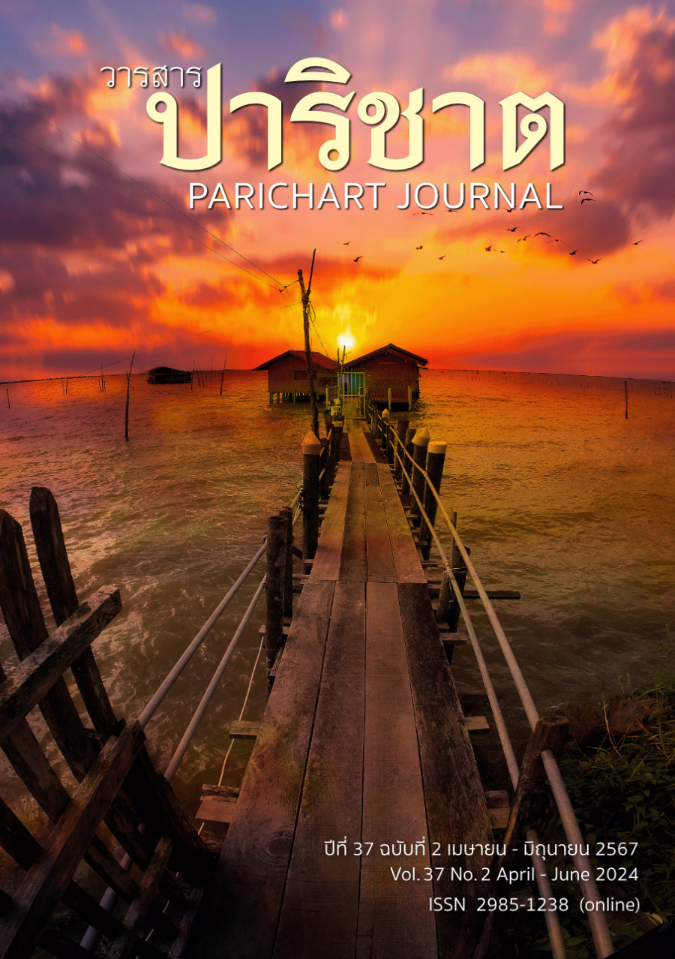The Study on Content and Literary Sense of Klon Lan in Trang Province
Main Article Content
Abstract
This qualitative research aimed to (1) examine general information of Klon Lan in Trang Province and (2) to analyze its content and literary sense in Trang Province. In-depth interview and focus group were utilized for data collection. Analytical description was used for data analysis. Subjects were those taking part in Klon Lan in Trang Province. Researchers used a snowball or chain sampling to gain research subjects. Research results showed that Klon Lan was a folk poem with no written history has been recorded. In the past, it was used to sing in inauspicious events at night by sitting round on the ground and singing poems. At present, however, it could be sung both in auspicious and inauspicious events. The purpose and content of singing depended on the event and/or chance. The poet needed to have the ability to use language well with tactfulness and nice voice. As for its social values, Klon Lan had the content that reflected way of life, belief, culture, tradition, and values of the local people. In the literary sense, the results revealed that Klon Lan is the poem with rhyme and rhythm like Klon Paet. The use of language in poems included both southern and standard Thai words depending on contents and chances. Repetitions of words, rhetorics and idioms were used in singing Klon Lan to achieve poetic flavor. Moreover, this poem used high and low tones, long and short voices, leading to the beautiful melody.
Article Details

This work is licensed under a Creative Commons Attribution-NonCommercial-NoDerivatives 4.0 International License.
References
Panich, U., & others. (2010). Language and principles of writing for communication. In Thai)
Department of Cultural Promotion Ministry of Culture. (2011). Knowledge of folk music and performance. (In Thai)
Document Processing and Archives Committee in the Celebration Organizing Committee His Majesty the King's honor. (1999). Culture, historical development. Identity and Wisdom, Trang Province. (In Thai)
Royal Academy. (2013). Dictionary, Royal Institute Edition 2011. (In Thai)
Thai Academic Department SE-ED Education. (2010). Thai Dictionary, modern and complete edition. (In Thai)
Phongpaiboon. N. (2021). The world needs reform. Matichon Sudsapda Edition, 42(55), 51.
Thai Cultural Encyclopedia Foundation Siam Commercial Bank. (1999). Encyclopedia of Southern Culture. (In Thai)
Royal Academy. (2013). Dictionary, Royal Institute Edition 2011. (In Thai)
Chuchuen, K. (2007). General local literature. (In Thai)
Vesapada, T. (2006). Homlokwannasilp. (In Thai)
Buasan, R. (2013). Qualitative research in education. (In Thai)
Panawong, C. (2020). Qualitative research methods. (In Thai)
Thai Cultural Encyclopedia Foundation Siam Commercial Bank. (1999). Siam Commercial Bank. (In Thai)
Khunying Long Atthakrawee Sunthon Learning Resource Center. (2018). Phleng Bok. https://shorturl.asia/ZOj5o. (In Thai)
Trang Provincial Public Relations Center. (2021). Glon Lan for campaigning to prevent the spread of coronavirus disease 2019. https://www.youtube.com/watch?v=4YwpmeCVOm8. (In Thai)
Rattanaburee, P. (2019). A Study of Southern Thailand Culture Reflections through Nung Ta Lung Poems: A Case Study of Nung Klaonoi Rojanamatakul. http://ir.tsu.ac.th/jspui/bitstream/123456789/250/1/Parin%20Rattanaburee%2000209341.pdf. (In Thai)
Doungtipya, S. (2015). An Analysis of Literary Language in Thai Country Songs of Nhoo Meter. The Golden Teak: Humanity and Social Sciences Journal, 21(2), 67-81. (In Thai)
Anukul, D. (2017). The changing of music in shadow puppet’s phenomenon. http://research.culture.go.th/medias/st154.pdf. (In Thai)


